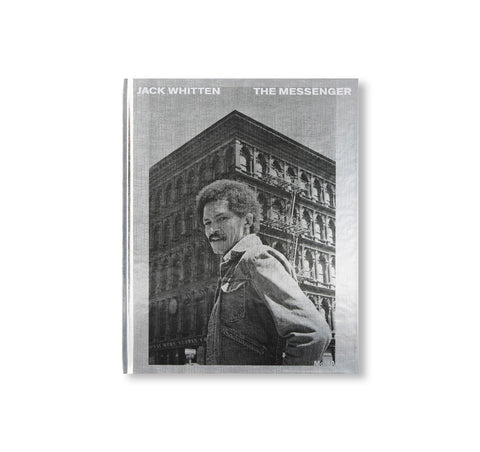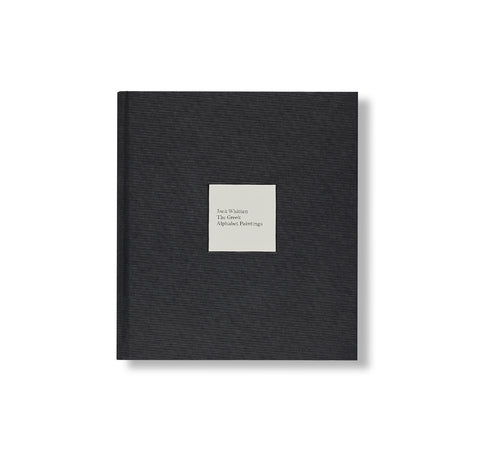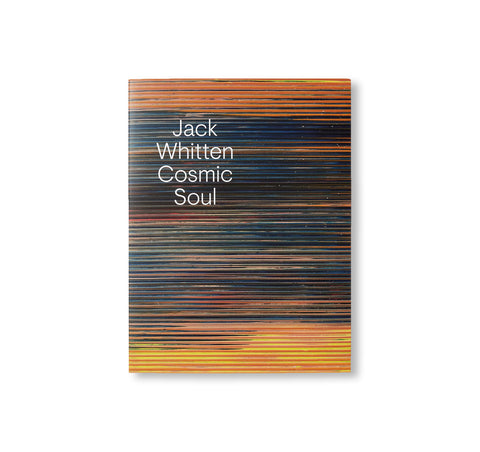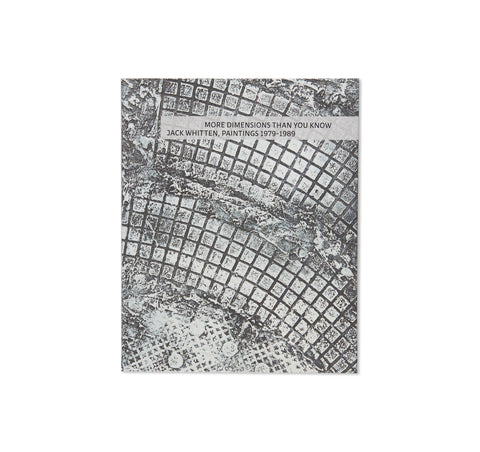SHADOWS LIFTED FROM INVISIBLE HANDS by James Hoff [LP]
ニューヨーク・ブルックリンを拠点に活動するアーティストであり、出版社「PRIMARY INFORMATION」の共同創設者兼ディレクターのジェームス・ホフ(James Hoff)による音楽作品。アメリカ人アーティスト、ジャック・ウィッテン(Jack Whitten)の作品「Mother’s Day 1979 For Mom」(1979年)がジャケットを飾る。
本作は、作者が「アンビエント・メディア」(環境音楽ならぬ、環境媒体)と称する4つの曲から成る自叙伝的レコードである。各トラックは、作者自身による、無意識下の聴覚風景から描き出されたソース、殊に音楽的なイヤーワーム(※註)と耳鳴りの周波数で構成されている。
明確な「音」でもなければ白昼夢でもないイヤーワーム(もしくは音楽的執着 / スタックソング症候群)は商業的形態として存在する音楽を象徴している。商業的な音楽は即効性があり、どこにでも存在し、持続性がある。同様に、耳鳴りは聞こえず、無節操であり、周波数スペクトルにいかようにも現れてくる。このような現象が認知の上で渦巻いていることで、アンビバレントで内的なサウンドトラックが供給され、世界における人の動きをスコア化しているのである。
耳鳴りに悩まされている人や、映画における「耳鳴り効果」に慣れている人にとってはレコードのハウリングなどのノイズは認識できるだろうが、曲ではそうもいかないだろう。
歪みと凝縮を経て、本作には4曲の商業的ポップスの改変版が収録されている。アメリカのバンド「ブロンディ(Blondie)」の「ハート・オブ・グラス(Heart of Glass)」、イングランド出身のロックミュージシャン、シンガーソングライターであるデヴィッド・ボウイ(David Bowie)の「スペイス・オディティ(Space Oddity)」、アメリカのシンガーソングライターであるマドンナの「イントゥ・ザ・グルーヴ(Into the Groove)」、アメリカのミュージシャン、ルー・リード(Lou Reed)の「パーフェクト・デイ(Perfect Day)」がそれにあたる。
この曲たちに長年悩まされ続けてきた作者は、トラックを調整し、移調し、オーケストラ用に作曲し直した。無意識的なエコーに話を戻すと、このトラック群は、そのソースの解読を難解にするために、さまざまな手を尽くし多くの労力を費やしている。まるでサンプルのように、それぞれのイヤーワームを単純に「改めて紹介する」ような形にしないよう注意が払われている。そうでなければ、意味があるだろうか。誰もそんなストリームを必要とはしないのである。
そして、イヤーワームは音楽ではない。そのように我々は認識してはいる。イヤーワームは内耳の蝸牛ではなく、主観的でも客観的でもない、感情的な力として存在しており、つまり侵略的で異質な現象なのである。これは耳鳴りと同様に、経済的、社会的、環境的な力によって、また同時に、作者自身の感情的な状態、精神的な健康状態、加齢によっても乱れる。作者はこのレコードについて、自身の精神的健康状態との闘いを控えめに語ることはせず、鬱病の長い歴史やここ数年の厳しさについてもそれは当てはまる。それが、この作品の作曲の背景となっているのである。
どんなポップソングも、一生懸命に針を落とすとその下には悲しみがある。根底を覗くと、この作品は、一種の儚い困憊と憂欝を呼び起こすものがある。作者は、オリジナルの楽曲を光と影のような二重性を通して書き直すことで、ポップミュージックの闇としての核に繋がる窓を開いているのだ。その中心には、反響するリフレインの上に構築される安易な高揚感を通して、資本主義が持つ絶望的な謀略が存在する。そのすぐ下で、聴き手は心を通じて踊っている影なる遺物に気づくのである。
※註 歌または音楽の一部分が頭の中で反復され、離れにくくなる現象
Shadows Lifted from Invisible Hands is an autobiographical record, comprised of four songs that Hoff refers to as ambient media. Each track is composed from sources drawn from his own involuntary aural landscape, specifically musical earworms and tinnitus frequencies.
Neither sound nor a daydream, the earworm (or stuck song) emblematizes music as a commercial form—immediate, ubiquitous, and persistent. Likewise, tinnitus is inaudible and unscrupulous, manifesting across a spectrum of frequencies at will. The cognitive swirling of these phenomena provides an ambivalent, internal soundtrack that scores a person’s movement through the world.
Those suffering from tinnitus or those who have grown accustomed to the “Tinnitus Effect” in movies will likely recognize the buzzing pitches on the record, but will likely not recognize the songs. Distorted and distilled, Shadows Lifted from Invisible Hands features altered versions of four commercial pop songs: Blondie’s “Heart of Glass,” David Bowie’s “Space Oddity,” Madonna’s “Into the Groove,” and Lou Reed’s “Perfect Day.”
Having been haunted by these songs on and off for years, Hoff tweaks the tracks, transposing and recomposing them for orchestral instrumentation. Speaking back to these involuntary echoes, these tracks go to great lengths to obfuscate their sources; to be sure not to simply re-introduce each earworm, as though they were samples. Otherwise, what’s the point? No one needs another stream.
Besides, earworms are not music, although we perceive them as such. They are non-cochlear and exist as an affective force that is neither subjective nor objective, which is to say they are an invasive—and alien—phenomenon. Like tinnitus, they are aggravated by economic, social, and environmental forces as well as emotional states, mental health, and aging. Hoff doesn’t underplay his own struggles with mental health in discussing the record—noting a long history of depression and its acuteness over the last few years, which serve as the backdrop to the composition of this record.
Scratch any pop song hard enough and you’ll find sadness underneath it. Subdermal, the songs on this record evoke a type of ephemeral weariness and despair. By recasting the original songs through their shadowy doubles, Hoff provides a window into the dark core of pop music. At the center of which lies capitalism’s desperate attempt to replicate itself through a cheap high built on echoing refrains. Just below the surface the listener finds a hangover of shadows dancing through the mind.
James Hoff is an artist living and working in New York. His work encompasses a variety of media, including sound, video, painting, and publishing. Hoff’s multidisciplinary approach begins at the user level—the level at which we interact with consumer technologies, media, and data. He has worked with computer viruses, inaudible data signals, ear worms, culture bound illnesses, dead zones, and hacked google maps as tools and framing devices for works that reimagine and expand the creative potential of digital and cultural networks beyond their economic and corporate-engineered use value. By exploiting and manufacturing technological and cognitive glitches, Hoff illuminates the social, political, and historical context of the software and media that we interact with on a daily basis.
Hoff co-founded Primary Information in 2006 to publish historical and contemporary artists’ books. The organization has published hundreds of titles, including facsimile editions of Art-Rite, Broken Music, Black Art Notes, Cornelius Cardew’s Stockhausen Serves Imperialism, Godzilla: Asian American Art Network, The New Woman’s Survival Catalog, and Womens Work as well as new works by Lawrence Abu Hamdan, DeForrest Brown Jr, Tony Conrad, Dara Birnbaum, Constance DeJong, Alexandro Segade, Martine Syms, and Flora Yin-Wong, among many others.
He has exhibited and performed at Artists Space, Bergen Kunsthall, the Carpenter Center for the Visual Arts at Harvard, Contemporary Arts Center (New Orleans), The Centre d’Art Contemporain (Geneva), Hessel Museum of Art, ICA London, The Kitchen, Kunsthall Oslo, The Royal Theatre of La Monnaie, MassMOCA, MoMA/PS1, Museum of Contemporary Art (Denver), and the Onassis Cultural Center, among many others.
All tracks (c) 2024 James Hoff
Mastered by Josh Bonati
Design by Bartolomé Sanson
Piano on Half-After Life by Marisol Limon Martinez
Cover Artwork: Mother’s Day 1979 For Mom (1979)
by Jack Whitten (Photo by Jeff McLane)
(c) Jack Whitten Estate. Courtesy the Estate and Hauser & Wirth.
![SHADOWS LIFTED FROM INVISIBLE HANDS by James Hoff [LP]](http://twelve-books.com/cdn/shop/files/ShadowsLiftedfromInvisibleHands_01.jpg?v=1721968150)
![SHADOWS LIFTED FROM INVISIBLE HANDS by James Hoff [LP]](http://twelve-books.com/cdn/shop/files/ShadowsLiftedfromInvisibleHands_06.jpg?v=1721968150)
![SHADOWS LIFTED FROM INVISIBLE HANDS by James Hoff [LP]](http://twelve-books.com/cdn/shop/files/ShadowsLiftedfromInvisibleHands_02.jpg?v=1721968150)
![SHADOWS LIFTED FROM INVISIBLE HANDS by James Hoff [LP]](http://twelve-books.com/cdn/shop/files/ShadowsLiftedfromInvisibleHands_03.jpg?v=1721968150)
![SHADOWS LIFTED FROM INVISIBLE HANDS by James Hoff [LP]](http://twelve-books.com/cdn/shop/files/ShadowsLiftedfromInvisibleHands_04.jpg?v=1721968150)
![SHADOWS LIFTED FROM INVISIBLE HANDS by James Hoff [LP]](http://twelve-books.com/cdn/shop/files/ShadowsLiftedfromInvisibleHands_05.jpg?v=1721968150)

![NOTES FROM THE WOODSHED by Jack Whitten [NEW EDITION]](http://twelve-books.com/cdn/shop/files/00_7d049e8c-b90a-498e-a8bd-20a1dd7638ad_large.jpg?v=1745565551)



